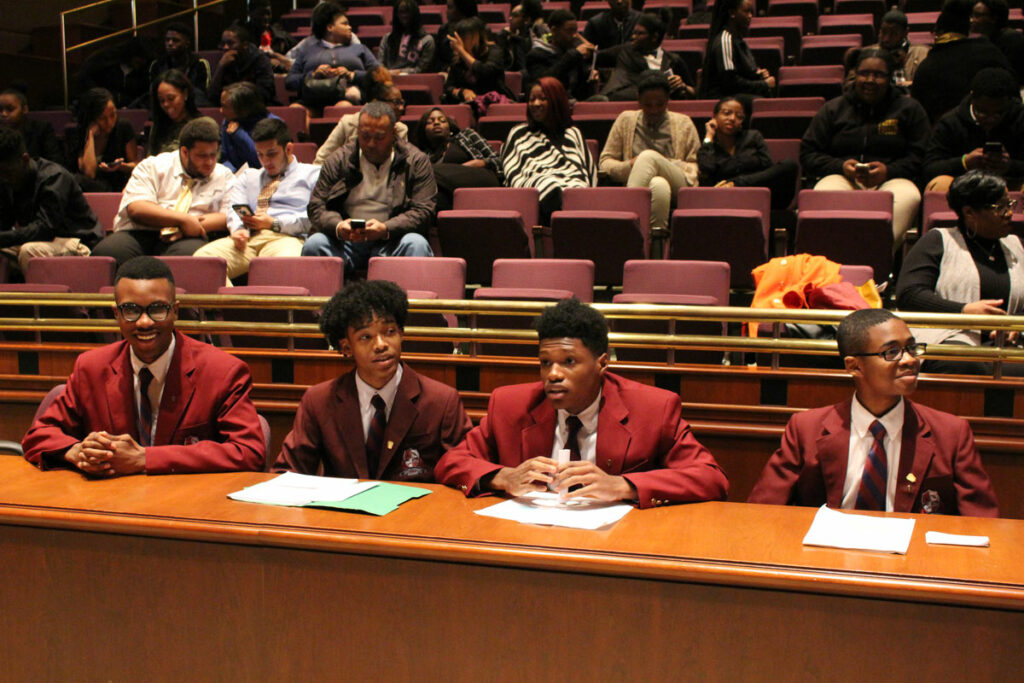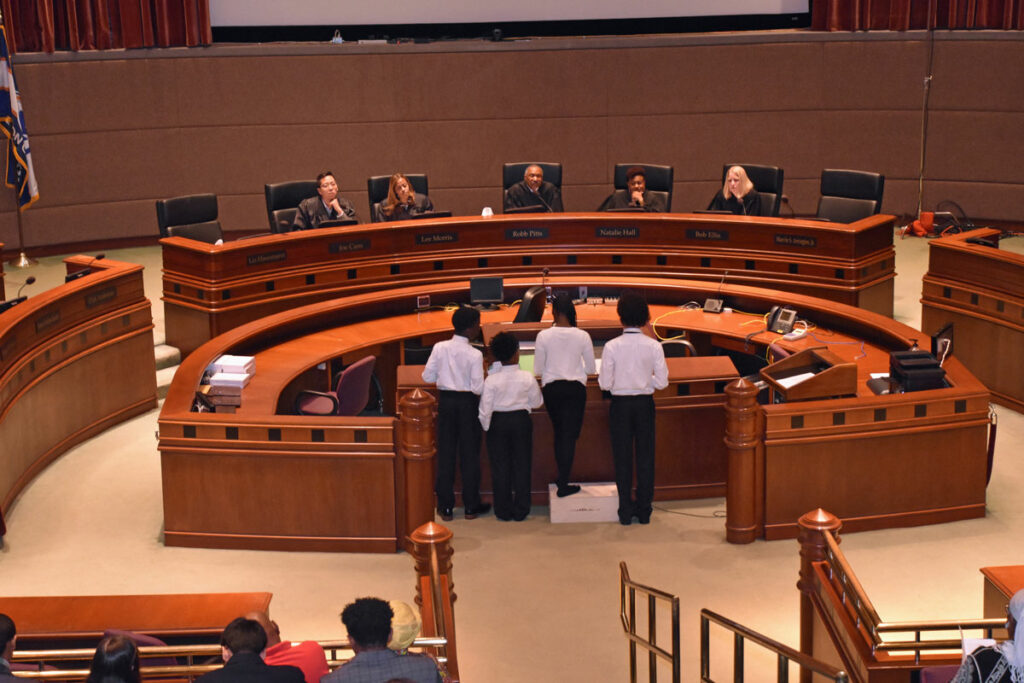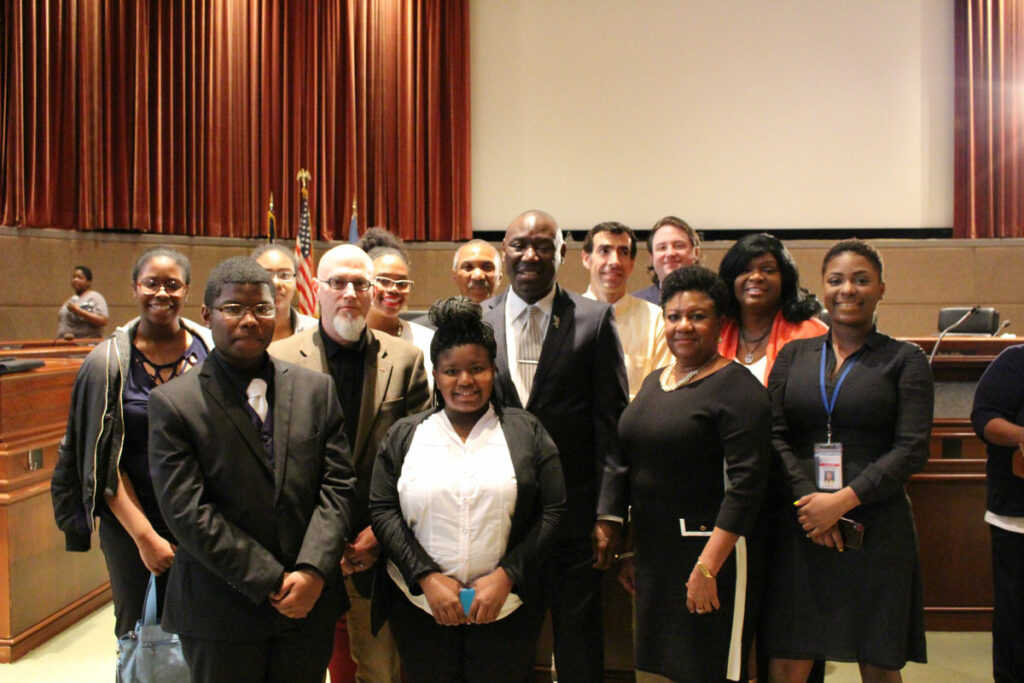Originally published October 2024
By Debra Tavaras
“May it please the court.” For the past 13 years, I’ve heard middle and high school students utter these words in a simulated moot court competition in Atlanta, GA. The competition is part of the Young Litigators Project, which provides an opportunity for youth to learn about the role of the Supreme Court, as well as their rights and responsibilities as citizens. The project educates youth on the rule of law and helps them to understand how laws directly impact their lives.
The Young Litigators Project began when I was hired by the Fulton County District Attorney’s office to develop and implement a teen court for a middle school that had a high truancy and suspension rate. Working with the school’s students, I noticed that they knew how the lower court worked, however they had limited knowledge of the Supreme Court and how its decisions can affect the entire country. I wanted to change this, and came up with the idea of developing a moot court competition among middle schools.
Through this competition, students tackle current issues like voter suppression, immigration, stand your ground, police conduct, bullying, and social media, just to name a few. They collaborate with volunteer lawyers and law students to write a legal brief and present oral arguments in front of distinguished judges, the likes of which have included Georgia Supreme Court Justices, U.S. Court of Appeals Attorneys, judges, attorneys, and law professors.
I have participated in programs for high school students before, but never for middle school students. These young people are just beginning to appreciate the significance of rules and more generally the rule of law. This was a superb launching pad for them.
— U.S. District Judge Peter J. Messitte
Moot Court vs. Mock Trial
First, a brief note about the difference between moot court and mock trial, as there’s often confusion around the two competitions. Moot court focuses on legal issues and appellate advocacy, while mock trial focuses on trial advocacy and courtroom procedures. In moot court, participants take on the role of attorneys making legal arguments, whereas in a mock trial there are several different roles they can take, including attorneys, witnesses, and sometimes jurors.
The skills that moot court emphasizes are legal research, brief writing, and oral arguments. Mock trails, on the other hand, concentrate on trial skills, witness examinations, evidence presentation, and trial strategy.
Academic Achievement
Now, onto the benefits.
Participating in a moot court competition provides students with many opportunities to strengthen their academic skills. Moot court requires students to conduct research, analyze complex legal issues, and develop oral arguments while enhancing their critical thinking and analytical skills. Students learn how to find credible sources, evaluate information, and synthesize findings. The experience also helps students improve their public speaking skills, articulate their thoughts clearly, respond to questions on the spot, and convey their points in a persuasive manner.
The competitions are team-based, requiring students to collaborate with peers to prepare arguments and strategize. Figuring out how to work effectively in a team setting fosters important people skills that can positively impact their ability to work in group projects as well as extracurricular activities.
Perhaps most important of all, participating in the Young Litigators Project strengthens students’ understanding of law and government. They gain a deeper knowledge of legal concepts, court procedures, and the functioning of the justice system. This, in turn, encourages students to begin thinking about justice, fairness, and the impact that legal decisions have on society.
I enjoy working with The Young Litigators Moot Court each year and I hope I am helping to cultivate a new generation of judges and lawyers and other civic leaders in the process.
— Amanda Jones, City of Atlanta, Office of the Public Defenders
Impact on Schools
Moot court competition offers several benefits for schools, such as attracting academically talented students who are interested in law, debate, or public speaking. Moot court coaching can serve as professional development for educators, enriching their teaching practices and enhancing their ability to mentor students in various academic pursuits.
The program can be integrated into the school curriculum to enhance subjects like civics, government, history, and language arts, providing students with first-hand opportunities to apply classroom knowledge to real-world issues. Schools that implement moot court also demonstrate a commitment to promoting civic engagement and critical thinking.
Moot court competitions can provide opportunities for schools to connect with other educational institutions, legal professionals, and community organizations as well. Networking with other schools encourages collaboration on academic initiatives, events, and resource sharing. The program can also cultivate a network of alumni who are enthusiastic about supporting their alma mater, which could lead to support through various forms, including mentorship, guest speaking, and assistance with coaching a team, as well as financial support.
I know that I would not be where I am today, personally, or professionally, if it was not for my participation with the Young Litigators Project. Not only has the project changed the trajectory of my life, but I have also been fortunate enough to witness how the organization transformed the lives of middle and high school students.
— Alvin Winston
Closing Arguments: Lasting Influence
Participation in moot court competitions offers middle and high school students an invaluable educational experience that extends far beyond the classroom. The program fosters personal growth, teaches discipline, resilience, and the ability to manage constructive criticism. It also cultivates skills that are important for continued academic success and prepares students for future careers. Most importantly, I feel the program helps them become informed and responsible citizens, regardless of the path they choose to pursue, and that pleases the court.
Debra Tavaras has over 30 years of experience with education and non-profits. She has served with several board of directors and was selected as the 2023 COABE State Advocate for Adult Education. She is also the founder of Soulstice Inc., a youth leadership organization that use a pro-social approach to involve youth in their school and community.




